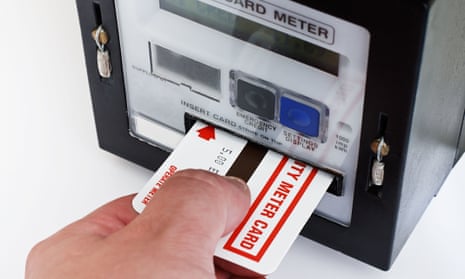The competition watchdog has been accused of bowing to pressure from the “big six” energy suppliers after proposing a watered-down series of remedies aimed at stopping UK consumers from being overcharged.
Opposition MPs, independent power companies and fuel poverty groups all warned the Competition and Markets Authority review would do little to stop householders paying £1.7bn a year too much for their energy.
Ovo Energy, one of the new breed of suppliers, said the last 18 months of investigation by the CMA had been “a complete waste of time and taxpayers’ money”.
The competition watchdog has called for a price cap on tariffs covering the 4m households on prepaid meters and wants a customer database to be set up to make switching supplier more easy.
However, the CMA has not widened that safeguard cap to include those stuck on high-cost standard variable tariffs and wants to scrap a four-tariff limit established only recently by energy regulator Ofgem to make price comparisons easier.
Earlier speculation that the big six would be broken up to separate their supply from their power generation arms was shelved by the CMA as a proposal last summer amid endless lobbying by the companies.
Lisa Nandy, Labour’s energy and climate change spokeswoman, said the latest remedies represented a missed opportunity: “This investigation has confirmed that millions of families and businesses have been overcharged for their energy bills to the tune of billions of pounds yet energy companies are still being let off the hook.
“This was a critical chance to shake up a broken energy market and make sure savings from falling wholesale prices are passed on to customers. Only more transparency and competition can deliver this.”
Steve Thomas, a professor of energy policy at the University of Greenwich, also believed the remedies would not prevent UK consumers being unnecessarily subjected to some of the highest energy bills in the European Union.
“The CMA report has failed to tackle what really concerns consumers: the UK is supplied by a cosy group of six companies who know very well without the need to collude that the last thing they need is the price war that real competition would lead to. The CMA measures will do little to change this.”
Laura Hill, for campaign group Fuel Poverty Action, said: “Today’s announcement is a testimony to the stranglehold of the big six over this investigation. Extensive lobbying has resulted in these pathetic watered-down recommendations which will have little impact on the majority of hard-pressed households who have spent the winter shivering in their home.”
But Roger Witcomb, head of the CMA investigation, said the “coherent and comprehensive package of reforms” would transform the energy sector.
He admitted the six largest suppliers had been taking existing domestic customers – some 70% of whom are on “default” standard variable tariffs – “for granted, not just over prices, but with their service and quality”.
But he added: “In those parts of the retail markets where competition is working, customers are benefiting to the tune of hundreds of pounds a year by switching. We’re proposing a wide range of bold, innovative measures to enable competition to grow further across the market so that millions more households will benefit.”
The CMA inquiry, launched in June 2014, was intended to clear up once and for all whether SSE, Iberdrola’s Scottish Power, British Gas-owner Centrica, RWE npower, E.ON and EDF Energy were abusing their dominance of the market.
However, the regulator has retreated from more radical proposals amid ferocious lobbying from the energy sector.
Centrica shares rose slightly as the City realised the changes would not affect the supplier very much.
Iain Conn, the chief executive of Centrica, made clear he was happy: “We believe that, provided they [the CMA remedies] are implemented thoughtfully, the majority will benefit our customers. We will work through the full report once we have it and submit a formal response in line with the required timetable.”
E.ON described the report as a “major milestone” of the CMA’s investigation and said it would review the material before making a detailed response. “We have been open and fully supportive of the investigative work undertaken by the CMA and we will continue to provide all necessary and relevant information as we move towards the final report in June.”
The big six have always argued the market is highly competitive and the profits commensurate with the risks they take.
The secretary for state for energy and climate change, Amber Rudd, said: “This is a wakeup call to the big six. Energy customers should get a fair deal from a market that works for them. That’s why we called for the biggest ever investigation into the energy market and won’t hesitate to take forward its recommendations.
“This report goes hand in glove with everything this government is doing to deliver a fair, competitive energy market that puts the families and businesses paying the bills first and the power back in their hands.”
Key CMA proposals
- New Ofgem-controlled database allowing rival suppliers to contact domestic and microbusiness customers stuck on default SVT tariff for three years or more to offer better deals
- A transitional price control for the 4m households on prepayment meters
- Give price comparison websites such as comparethemarket.com access to customer data such as meter numbers and allow them to negotiate exclusive deals with suppliers
- Remove the four tariff rule which limits competition and innovation
- Remove restrictions hindering new suppliers competing for prepayment customers and reduce barriers to switching such as debt issues
- Allow the 700,000 households on non-Economy 7 restricted meters to switch to cheaper single-rate tariffs without requiring a meter replacement
- Prioritise Ofgem’s programme to help provide domestic customers with clearer information
- Strengthen Ofgem’s independence and reporting powers.

Comments (…)
Sign in or create your Guardian account to join the discussion